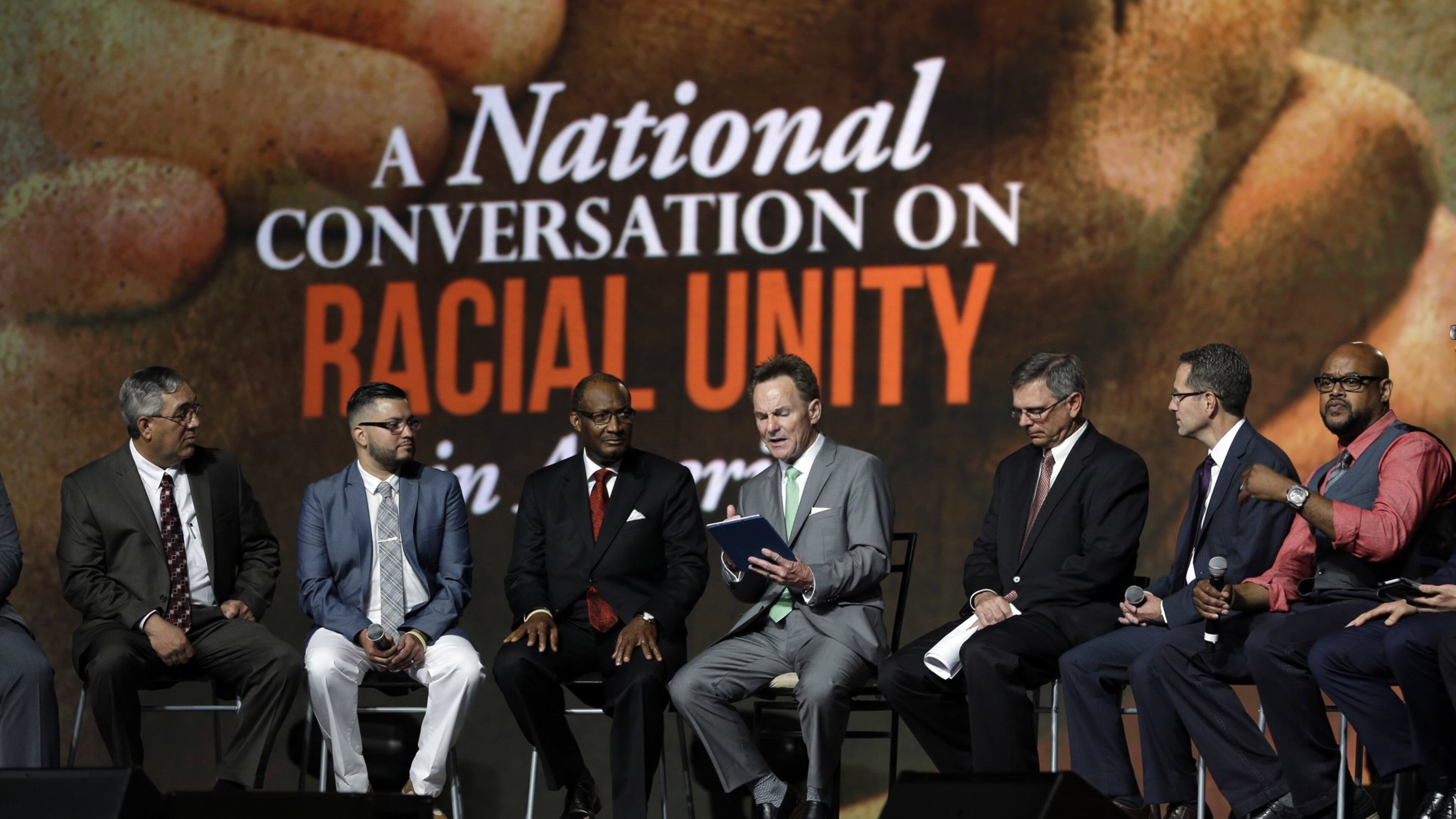Duluth pastor leads Baptist effort against Confederate flag

A Duluth pastor helped to lead the charge Tuesday in the Southern Baptist Convention’s historic vote against displaying the Confederate battle flag.
Rev. James Merritt, lead pastor of Cross Pointe Church in Duluth, stepped to the microphone during the Baptists’ conference here and offered an amendment to a flag resolution that made it clear the group wanted people to put away the flag.
“This is a seminal moment for our SBC,” Merritt said. He added, “This flag is a stumbling block to many African-American souls to our witness, and I say that all the Confederate flags in the world are not worth one soul of any race.”
A roar of approval rose from the hall.
The group overwhelmingly approved the resolution at its annual conference acknowledging that the flag is perceived by many as a symbol of “hatred, bigotry and racism,” and urging people to take it down.
The resolution said, “We call on our brothers and sisters in Christ to discontinue the display of the Confederate battle flag as a sign of solidarity of the whole body of Christ, including our African-American brothers and sisters.”
Critics of the embattled banner took that as a huge victory.
“I am almost to the point of tears,” said the sponsor of the resolution, the Rev. Dwight McKissic, senior pastor of the SBC-affiliated Cornerstone Baptist Church in Arlington, Texas. The African-American pastor added, “I’m so happy that God has touched the hearts of those people, to realize that the kingdom of God is more important than that flag.”
The SBC resolution is not binding on its 15 million members. But the vote by the 7,200 members here represented a significant step for a group struggling to reach minorities and escape its roots in the racism of the Civil War South.
Moreover, the statement could reverberate far beyond this convention. The SBC is America’s largest Protestant denomination, and other conservative religious groups take their lead from them, said Derrick Lemons, a University of Georgia assistant professor of religion.
“This makes a huge statement on the use of the Confederate flag,” Lemons said. “(It’s) a huge confirmation of the Southern Baptist Convention to move away from the display of the Confederate flag.”
The "messenger" delegates here emphasized that their vote took place some 10 miles from Ferguson, Mo., a city riven by racial violence two years ago, and nearly a year to the day that a white man gunned down nine black church members in South Carolina.
“I think this shows the Southern Baptist Christians’ concern for racial reconciliation, and the hope we have for our churches and the nation,” said the Rev. Bryant Wright of Johnson Ferry Baptist Church in Marietta, who attended the conference.
But some Baptists and supporters of the Confederate flag criticized the resolution as an ill-conceived attempt at political correctness that misses the true meaning behind the banner.
“I’m a Southern Baptist and I personally believe this is ignorant and/or politics,” said Michael Landree, executive director of the Sons of Confederate Veterans. “The men who fought this war, very few of them were slave owners. They fought for several reasons. The majority of them were constitutional, economic and the fact that they were invaded.”
Winston Taylor of Gospel Fellowship Church in West Atlanta, who is African-American, also opposed the resolution.
Pressuring people to take down something comes too close to censorship for him, he said.
“I’m not into covering up things,” he said.
He worried that repressing people’s feelings might lead to even more trouble later.
“When they’re flying the flag, at least you know where they stand,” Taylor said. “When you repress it, somebody can become so frustrated that they go and kill a room full of people.”
The tenor of this year's SBC meeting was different from last year, when convention president Rev. Ronnie Floyd declared "spiritual warfare" on gay marriage, shortly before the U.S. Supreme Court endorsed the practice.
The centerpiece of this year’s meeting was a multi-racial panel discussion titled “A National Conversation on Racial Unity in America.” And the resolution on the Confederate flag reflected that emphasis.
Still, behind the scenes, the Confederate flag resolution caused some consternation. Rev. McKissic, the sponsor, had originally asked for a strong repudiation of the flag as a symbol of racism. But numerous members, while supportive of a racial unity message, were wary of venturing into that intensely controversial debate.
Some saw the flag controversy as a no-win issue for the convention, said the Rev. Mike Stone of Emmanuel Baptist Church in the South Georgia community of Blackshear. If they supported the resolution, they felt they would offend those who see it as heritage, and look like latecomers to a pile-on against the flag. If they rejected the resolution, they would look racist.
“I feel anything said about it is going to be divisive,” Stone said.
The resolution came to the floor in an edited version by the convention’s resolution committee, which sought to recognize the negative perception of the flag as it diplomatically urged people to consider removing it.
The resolution changed again in an electrifying moment when Rev. Merritt, of Duluth, addressed the hall filled with thousands.
“What we do today will reverberate through this nation, not just today but 100 years from now,” he said.
As Merritt walked from the mic, Chris Pearson, an African-American from Ferguson, walked up, shook his hand and said, “Thank you.”

